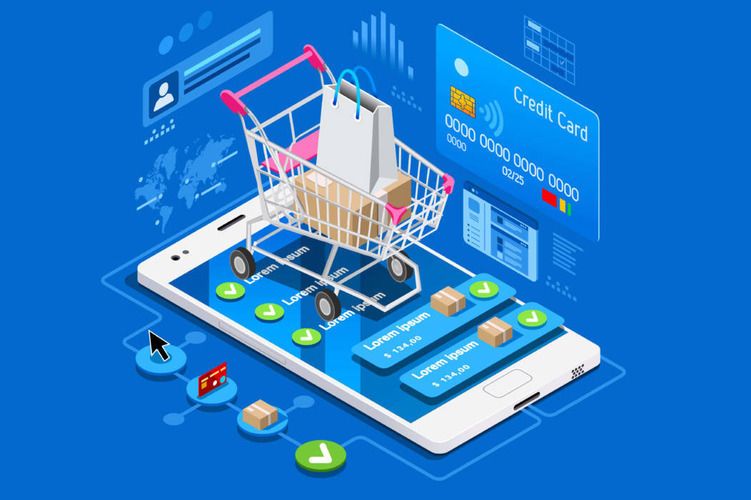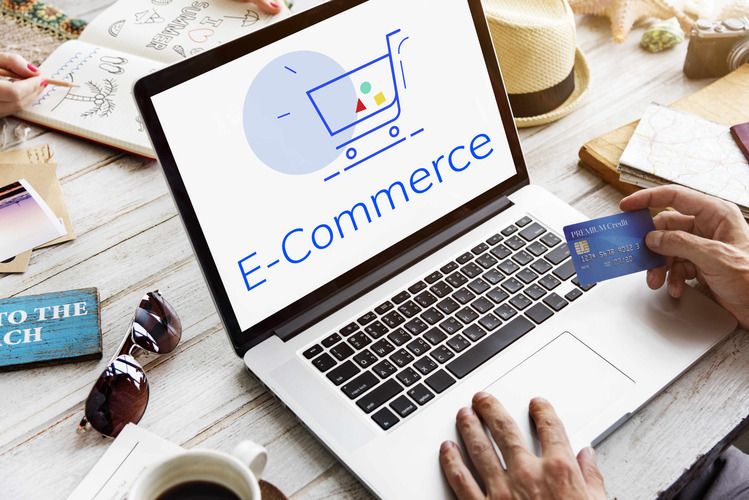In today's rapidly evolving digital landscape, the question is no longer if your business needs an online presence, but how robust that presence needs to be. For many, the answer increasingly points towards the undeniable necessity of e-commerce website development. More than just a digital storefront, an e-commerce platform is a multifaceted strategic asset that can redefine your business's reach, profitability, and long-term sustainability.
The statistics speak for themselves. Global e-commerce sales continue their astronomical climb, with projections indicating trillions in revenue in the coming years. Consumers are increasingly comfortable, and indeed prefer, the convenience of online shopping, a trend significantly accelerated by recent global events. If your business isn't actively participating in this digital marketplace, you're not just missing out on opportunities; you're actively falling behind.
Let's delve into the myriad reasons why investing in professional e-commerce website development is not just beneficial, but absolutely crucial for your business in the modern era.
1. Unrestricted Global Reach and Accessibility
Perhaps the most compelling argument for an e-commerce website is its ability to obliterate geographical boundaries. A physical store, no matter how strategically located, is limited by its immediate vicinity and operating hours. An e-commerce website, conversely, is open 24 hours a day, 7 days a week, 365 days a year, to anyone with an internet connection, anywhere in the world.
This unparalleled accessibility means you can tap into entirely new customer segments and markets that were previously unattainable. Imagine a small artisanal craft shop in Surat suddenly reaching customers in New York, London, or Sydney. This global reach is not a luxury; it's a fundamental shift in how businesses can operate and grow, offering a virtually unlimited customer base.
2. Enhanced Customer Convenience and Experience
Modern consumers demand convenience. They want to shop when and where they choose, compare prices effortlessly, read reviews, and have products delivered directly to their doorstep. An e-commerce website delivers precisely this.
Customers can browse products at their leisure, without feeling rushed or pressured. They can access detailed product descriptions, high-quality images, and even videos. Features like search filters, personalized recommendations, and easy checkout processes significantly enhance the user experience. A positive online shopping experience translates directly into customer satisfaction, repeat business, and positive word-of-mouth.
3. Reduced Operational Costs
While initial development costs exist, an e-commerce website can significantly reduce long-term operational expenses compared to a traditional brick-and-mortar store. Consider the overheads associated with a physical location: rent, utilities, property taxes, extensive sales staff, security, and maintenance.
An e-commerce platform, while requiring ongoing maintenance and digital marketing efforts, generally operates with lower fixed costs. You might require a smaller physical footprint for inventory or a streamlined fulfillment process. This cost efficiency can translate into more competitive pricing for your customers or healthier profit margins for your business.
4. Scalability and Growth Potential
E-commerce platforms are inherently scalable. As your business grows, your website can be expanded to accommodate increased traffic, a larger product catalog, and new features. Unlike a physical store that might require extensive renovations or a new location to expand, an e-commerce site can often be scaled up with relatively less friction and cost.
This scalability is crucial for businesses with growth aspirations. Whether you're adding new product lines, expanding into international markets, or experiencing a surge in demand, a well-developed e-commerce platform can adapt and support your growth trajectory seamlessly.
5. Data-Driven Insights and Personalization
One of the most powerful advantages of e-commerce is the wealth of data it provides. Every customer interaction, from Browse patterns to purchase history, can be tracked and analyzed. This data is invaluable.
You can gain deep insights into customer preferences, popular products, peak shopping times, and even where customers abandon their carts. This information allows for highly targeted marketing campaigns, personalized product recommendations, and informed business decisions. For example, if you know a customer frequently purchases dog food, you can send them tailored offers for pet accessories, increasing the likelihood of conversion. This level of data-driven personalization is almost impossible to achieve in a traditional retail setting.
6. Enhanced Marketing Opportunities
An e-commerce website serves as a central hub for all your digital marketing efforts. It provides a platform for Search Engine Optimization (SEO), allowing your products and services to rank higher in search engine results. It integrates seamlessly with social media marketing, allowing you to drive traffic directly to your product pages.
You can leverage email marketing, pay-per-click (PPC) advertising, content marketing, and affiliate marketing directly through and around your e-commerce site. The ability to track the effectiveness of these campaigns and attribute sales to specific marketing channels empowers you to optimize your marketing spend and achieve a higher return on investment (ROI).
7. Brand Building and Credibility
In the digital age, a professional and user-friendly e-commerce website is a cornerstone of brand building and credibility. It presents a modern, trustworthy image of your business. Customers often perceive businesses with a well-designed online presence as more legitimate and reliable.
Your website allows you to tell your brand story, showcase your values, and build a strong online identity. It provides a consistent brand experience across all touchpoints, fostering trust and loyalty among your customer base.
8. Direct Customer Communication
An e-commerce website facilitates direct communication with your customers. Through contact forms, live chat functionalities, customer service portals, and even product review sections, you can engage directly with your audience.
This direct line of communication allows you to address queries promptly, resolve issues efficiently, and gather valuable feedback. This not only improves customer satisfaction but also provides insights that can be used to improve your products and services.
9. Competitive Advantage
In an increasingly competitive marketplace, an e-commerce website is no longer a luxury but a necessity to stay relevant. Businesses that fail to establish a robust online presence risk being outmaneuvered by competitors who embrace digital commerce.
Having an e-commerce site allows you to compete on a level playing field with larger businesses and reach customers your brick-and-mortar rivals cannot. It empowers you to innovate, adapt, and respond to market changes more swiftly.
10. Future-Proofing Your Business
The future of commerce is undoubtedly digital. Investing in e-commerce website development today is an investment in the long-term viability and growth of your business. It positions you to capitalize on emerging technologies, evolving consumer behaviors, and the ever-expanding digital economy.
The trends of online shopping, mobile commerce, and integrated digital experiences are not fleeting fads; they are fundamental shifts in how commerce is conducted. By developing a strong e-commerce presence, you are future-proofing your business and ensuring its continued success in the years to come.
Conclusion: Embrace the Digital Imperative
The evidence is clear: e-commerce website development is not just crucial, but indispensable for any business aiming to thrive in the modern era. From expanding your reach and enhancing customer experience to reducing costs and gaining invaluable data insights, the benefits are too significant to ignore.
It's an investment that pays dividends in increased sales, stronger brand loyalty, and a future-proof business model. If you haven't already, now is the time to prioritize your e-commerce development journey and unlock the immense potential of the digital marketplace. Your business's future depends on it.





Top comments (11)
Absolutely agree—e-commerce website development is no longer optional, it’s essential for business growth. A well-designed site builds trust, provides a smooth customer journey, and makes your brand accessible 24/7. Beyond functionality, presentation also plays a big role in grabbing attention—whether it’s through product descriptions, calls-to-action, or even how your text is styled. For example, tools like stylish-name.in/
let you convert plain text into bold, fancy, or stylish fonts, which can be useful for highlighting offers, headings, or social media promotions linked to your store. Just like solid development creates the foundation, stylish presentation adds that extra spark to attract and retain customers.
E-commerce website development is essential for business growth because it expands reach, enhances brand credibility, and creates seamless purchasing experiences. Just like crafting High Converting Rehab Ads requires understanding audience behavior, an optimized e-commerce site relies on strategic design and data-driven insights to turn visitors into loyal customers. Businesses benefit from better visibility, analytics, and automated marketing tools that boost sales and engagement. A well-structured website not only drives conversions but also builds trust, ensuring long-term growth in an increasingly competitive digital marketplace.
E-commerce website development is crucial for business growth because it creates a professional online presence that attracts and converts customers. High-quality ecommerce photography enhances product presentation, building trust and increasing sales. Investing in e-commerce website development combined with compelling ecommerce photography drives engagement, boosts credibility, and ultimately accelerates business growth, turning visitors into loyal customers.
In today’s digital age, having a professionally designed e-commerce website isn’t just an option, it’s a necessity for staying competitive. Whether you’re a small startup or an established brand, your online presence directly impacts your visibility and revenue potential.
If you’re looking to take your online store to the next level, I recommend reading “Ecommerce Conversion Improvement Tips” by the Soodo website. It provides practical insights and strategies to help increase conversions and maximize the performance of your e-commerce business.
E-commerce website development is crucial for business growth because it allows companies to reach a global audience, operate 24/7, and provide customers with a seamless shopping experience. A well-designed online store helps build trust, boost sales, and strengthen brand visibility. Working with these search engine optimization experts ensures that your e-commerce site ranks higher on search engines, attracting more qualified traffic. Agencies like Net Connect Digital Agency specialize in creating user-friendly, SEO-optimized e-commerce websites that drive conversions and help businesses scale efficiently in today’s competitive digital market.
Absolutely! E-commerce website development plays a huge role in business growth — it’s where first impressions happen. 💻✨ The right design, layout, and font choices can instantly make your online store look more trustworthy and professional. Fonts aren’t just text — they communicate your brand’s style and emotion. Whether it’s a bold font for confidence or a sleek modern one for luxury, the typography you use can actually influence how customers feel while shopping. 🛍️ #ecommercewebdevelopment #fonts #branding copyfontsonline.com/
Excellent web design is crucial to succeed in today's world. You've to be extra careful regarding UI/UX of website. I hired Fourseven Media for web designing and development which is based in UK.
One more question, one of my client sell metal sheds through his website, what strategies we should apply to boost sales?
Hey, my client sells automotive and car products and especially ptfe fuel hoses. What do you suggest?
Loucoutoma2007@gmail.com
I found this website to be quite impressive due to its clear explanations and regularly updated content. The effort put into writing informative and easy-to-understand articles really shows. It’s definitely a useful resource for users who want reliable information.
Finding a stylish name Urdu becomes easy with this platform. The output remains clean and visually balanced. The process is simple and suitable for all types of users.